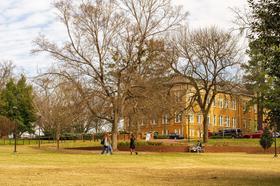Serving 218 students in grades Prekindergarten-3, Martin Luther King Early Childhood Center ranks in the bottom 50% of all schools in Arizona for overall test scores (math proficiency is bottom 50%, and reading proficiency is bottom 50%).
The percentage of students achieving proficiency in math is 11-19% (which is lower than the Arizona state average of 34%). The percentage of students achieving proficiency in reading/language arts is ≤10% (which is lower than the Arizona state average of 40%).
The student-teacher ratio of 13:1 is lower than the Arizona state level of 17:1.
Minority enrollment is 98% of the student body (majority Hispanic), which is higher than the Arizona state average of 66% (majority Hispanic).
Quick Facts (2026)
- Grades: Prekindergarten-3
- Enrollment: 218 students
- Student-Teacher Ratio: 13:1
- Minority Enrollment: 98%
- Overall Testing Rank: Bottom 50% in AZ
- Math Proficiency: 11-19% (Btm 50%)
- Reading Proficiency: ≤10% (Btm 50%)
- Source: National Center for Education Statistics (NCES), AZ Dept. of Education
Top Rankings
Martin Luther King Early Childhood Center ranks among the top 20% of public schools in Arizona for:
Category
Attribute
Percent Eligible For Free Lunch
School Overview
Martin Luther King Early Childhood Center's student population of 218 students has grown by 6% over five school years.
The teacher population of 17 teachers has stayed relatively flat over five school years.
Grades Offered
Grades Prekindergarten-3
(No virtual instruction)
(No virtual instruction)
Total Students
218 students
Gender %
Total Classroom Teachers
17 teachers
Year Founded
2025
School Rankings
Martin Luther King Early Childhood Center ranks within the bottom 50% of all 1,921 schools in Arizona (based off of combined math and reading proficiency testing data).
The diversity score of Martin Luther King Early Childhood Center is 0.50, which is less than the diversity score at state average of 0.66. The school's diversity has stayed relatively flat over five school years.
Overall Testing Rank
#1729 out of 1921 schools
(Bottom 50%)
(Bottom 50%)
Math Test Scores (% Proficient)
11-19%
34%
Reading/Language Arts Test Scores (% Proficient)
≤10%
40%
Student-Teacher Ratio
13:1
17:1
American Indian
1%
5%
Asian
1%
3%
Hispanic
64%
48%
Black
30%
6%
White
2%
34%
Hawaiian
n/a
n/a
Two or more races
2%
4%
All Ethnic Groups
Participates in the National School Lunch Program (NSLP)
Yes
Eligible for Free Lunch
3%
40%
Eligible for Reduced Lunch
3%
7%
School Statewide Testing
School District Name
Source: National Center for Education Statistics (NCES), AZ Dept. of Education
Profile last updated: 02/09/2025
Frequently Asked Questions
What is Martin Luther King Early Childhood Center's ranking?
Martin Luther King Early Childhood Center is ranked #1729 out of 1,921 schools, which ranks it among the bottom 50% of public schools in Arizona.
What percent of students have achieved state testing proficiency in math and reading?
11-19% of students have achieved math proficiency (compared to the 34% AZ state average), while ≤10% of students have achieved reading proficiency (compared to the 40% AZ state average).
How many students attend Martin Luther King Early Childhood Center?
218 students attend Martin Luther King Early Childhood Center.
What is the racial composition of the student body?
64% of Martin Luther King Early Childhood Center students are Hispanic, 30% of students are Black, 2% of students are White, 2% of students are Two or more races, 1% of students are American Indian, and 1% of students are Asian.
What is the student-teacher ratio of Martin Luther King Early Childhood Center?
Martin Luther King Early Childhood Center has a student ration of 13:1, which is lower than the Arizona state average of 17:1.
What grades does Martin Luther King Early Childhood Center offer ?
Martin Luther King Early Childhood Center offers enrollment in grades Prekindergarten-3 (No virtual instruction).
What school district is Martin Luther King Early Childhood Center part of?
Martin Luther King Early Childhood Center is part of Roosevelt Elementary District (4279).
In what neighborhood is Martin Luther King Early Childhood Center located?
Martin Luther King Early Childhood Center is located in the South Mountain Village neighborhood of Phoenix, AZ. There are 45 other public schools located in South Mountain Village.
School Reviews
Review Martin Luther King Early Childhood Center. Reviews should be a few sentences in length. Please include any comments on:
- Quality of academic programs, teachers, and facilities
- Availability of music, art, sports and other extracurricular activities
Recent Articles

Zero Tolerance Policies in Public Schools Today
An updated look at zero tolerance policies in public schools, including current trends, costs, legal concerns, and what parents need to know now.

The Pros and Cons of Tracking in Schools Today
Explore the advantages and drawbacks of academic tracking in today’s public schools, including equity, outcomes, and what parents should consider.

Budgeting Hidden Costs of Public Schooling in 2026
Learn how families budget for school lunch, after-school care, and activities, the hidden costs of public schooling in 2026.





